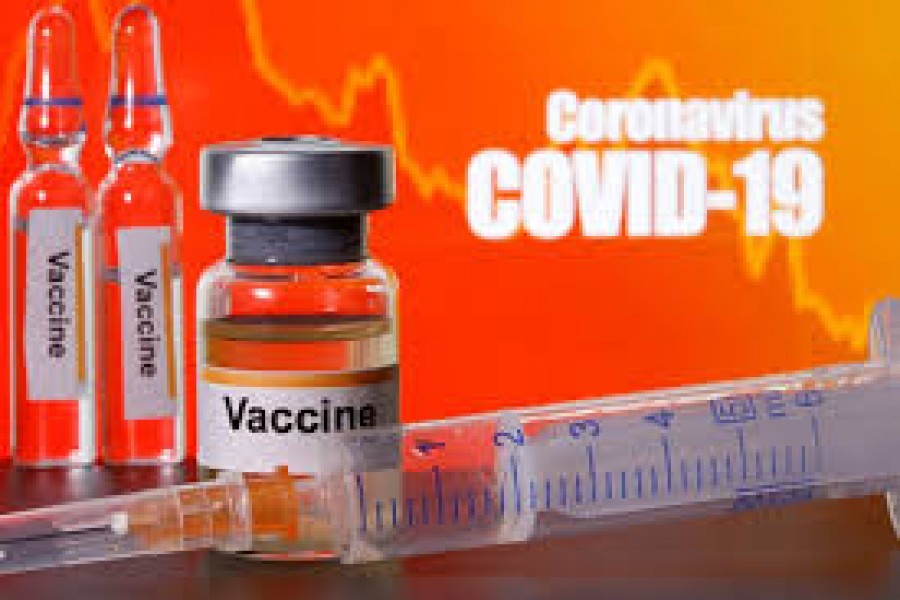The world is eagerly waiting for an effective vaccine against novel coronavirus that has been wreaking havoc for the past three months.
Though the peoples across world got disheartened, to some extent, by the World Health Organisation's latest observation that the world might have to live with the coronavirus like ones responsible for causing diseases such as AIDS and measles, they, apparently, have not lost all hope.
In fact, researchers at universities and large drug manufacturing companies are now engaged in a rat race for developing a suitable vaccine against the virus that have until Saturday infected more than 4.6 million people and claimed more than 0.31 million lives in 213 countries and territories.
Global efforts centring around the development of a vaccine has become so intense that it has given rise to political tensions between, at least, a couple of countries. The Trump administration since the outbreak of the COVID-19 has been holding China responsible on many counts, including suppression of information about the disease. Lately, it has accused China of launching cyber attack on relevant US entities involved in COVID-19 vaccine research.
The ongoing tension between French giant drug manufacturer Sanofi and President Emmanuel Macron is a case in point. The CEO of Sanofi reportedly made a public statement saying that the US will be the first country to get the vaccine that it is now developing jointly with another global pharmaceutical giant GSK. The US has made available a substantial amount of money to the Sanofi for the research work. However, the Sanofi-GSK vaccine is still in pre-clinical stage.
The statement drew instant reaction from the French government and Macron summoned the Sanofi CEO for an explanation. The latter, however, backtracked claiming that his statement has been 'misinterpreted'.
Never before had the world witnessed an urgency equivalent to the ongoing one for developing a suitable vaccine against a contagious disease. As the novel coronavirus started affecting countries one after another at a rapid pace, scientists, physicians, funders and manufacturers on April 13 this year signed a declaration, under the auspices of the WHO, to develop vaccines against COVID-19. Many drug manufacturers and research institutes by then had started work on developing vaccines against the disease.
Often development of a vaccine does take more than a decade's time. Now it is expected to be accomplished in a record time--12 to 18 months. It will not be surprising if any research institute/drug manufacturer does it even before that time.
As of now, eight vaccines, including one developed by the University of Oxford of the United Kingdom, are under phase two of their clinical evaluation. More 110 vaccines are now going through pre-clinical evaluation. The Oxford's vaccine has reportedly been injected into humans, but the outcome is still awaited. But, in the meanwhile, the university authority has claimed that their vaccine has been successful in producing effective antibody in monkeys. The success has made the scientists more optimistic about effectiveness of the vaccine in humans. Once successful, the university authority expects to produce at least 1.0 million doses of vaccine by September next.
Will Bangladesh be able to use the COVID-19 vaccine soon after its development? This trillion-taka question has been agitating the minds of millions here. Though the WHO says right to the COVID vaccine will be universal, in reality access to it is unlikely to be instant. The availability of the vaccine in the country might take time.
Bangladesh being a least developed country (LDC), enjoys exemptions from patenting rights of pharmaceutical products and vaccines as guaranteed under the Trade-Related Aspects of Intellectual Property Rights (TRIPS).
Local pharmaceutical companies taking advantage of the exemptions have flourished over the years. Leading drug manufacturers are also fetching handsome revenues through exports of their products.
However, until recently, there was no vaccine production facility in the country. One large drug manufacturing company has set up its a state-of-the art vaccine producing facility that produces both human and animal vaccines. But it is not known whether it will be able to produce COVID-19 vaccine.
The TRIPS exemptions do encourage the developed countries to transfer of technology to the LDC members in the matter of drug and vaccine production. But much would depend on the former's willingness and latter's capacity to produce vaccines.
The vaccine production is not as easy as manufacturing of generic drugs. It needs substantial investment in technology and skilled manpower. Moreover, as far as return on investment is concerned, it is not that rewarding. However, immunisation vaccines applied on children and adults, in some cases, do fetch good returns.
Under the prevailing circumstances, countries like Bangladesh are left with no option but to have faith in President Macron's observation that all countries must have equal access to COVID-19 vaccine, if and when developed. The incumbent director general of WHO had earlier laid a similar emphasis on the issue. Hopefully, the WHO will play a strong role in ensuring easy and fast access of poor countries, including Bangladesh, to COVID-19 vaccine, when developed.


